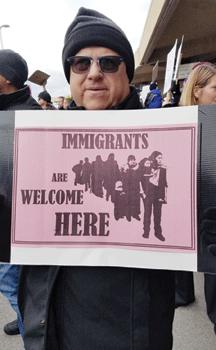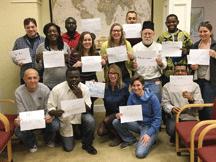
Since its founding in 1949 to support Holocaust survivors, JVS has worked to resettle refugees from around the world. It is now the metro’s largest refugee resettlement agency, and this week, with the help of members of the Jewish and general communities, it is fighting for the rights of refugees to settle here in the United States.
On Friday, Jan. 27, President Donald Trump approved an executive order that suspended entry of all refugees to the United States for 120 days, barred Syrian refugees indefinitely and blocked entry into the United States for 90 days for citizens of seven predominantly Muslim countries: Iran, Iraq, Libya, Somalia, Sudan, Syria and Yemen. Though the meaning and the implementation of the order continues to change, it also seems to bar legal permanent residents (green card holders) from those countries from re-entering the United States.
Since 2004, JVS has helped more than 5,000 refugees “find safety and dignity when global chaos and violence has forced them from their homes,” JVS Executive Director Hilary Cohen Singer said. Last year, JVS resettled 588 refugees from 14 different countries, including five of the seven countries affected by the travel ban — Iran, Iraq, Syria, Sudan and Somalia. She said that, before the order was signed last week, the agency was expected to resettle 600 refugees in 2017.
Now she is unsure how many of those will come to the U.S. and Kansas City. About 35 people are scheduled to arrive here between now and mid-February.
“At this point, most of those are now cancelled,” Singer said. “We have heard that holders of special immigrant visas from Afghanistan will be allowed to enter, and we did have a family like that who arrived Monday night.”
In addition to those who move here every year, JVS serves thousands more in Kansas City’s refugee community with employment and health services. Under the executive order, most of those refugees would not have been able to come to the United States.
“This will affect families escaping harrowing brutality, and those needing critical medical attention,” explained Singer. “The executive order also means that many families already in the U.S. will not be able to reunite with their husbands, wives and children who are still overseas.”
She said many of these people are separated “because the desperation to get to America and out of the situation that they are in is so great that people are willing to break up families to do that. So, we have people come ahead of their spouse, establish themselves and then wait for their spouses’ authorizations to come through.”
Now, Singer said, many of these people have no idea when they will see their loved ones next. On top of that, they are now scared because this executive order has threatened their entire sense of security.
As Singer explains it, these refuges didn’t have a future and constantly felt unsafe in their native lands. If they are allowed into the United States as refugees, they are eligible to become legal permanent residents after one year here, and that, she said, provides them with and added layer of practical security as well as emotional security.
“They work, they pay taxes, they send their kids to school, they get their legal permanent residency, and they think that gets them some measure of security, and now to see that legal permanent residents of this country are being turned away at the border is terrifying to them.”
Singer thinks the Jewish community is in a unique situation to be connected to this national issue for many reasons, one being that JVS, an agency with such a Jewish history, is directly engaged in this work that at one point served Jewish people and now serves a Jewish purpose.

That Jewish purpose can be found in the Torah. Rabbi David Glickman, senior rabbi of Congregation Beth Shalom, shared on Facebook Sunday that the confirmation class studied Torah passages on the theme of welcoming the stranger that were provided by HIAS.org, the organization once known as the Hebrew Immigrant Aid Society. One is from Exodus 22:20, “You shall not wrong nor oppress a stranger, for you were strangers in the land of Egypt.” (For more, visit hias.org and search refugee Torah.)
Rabbi Jonathan Sacks, in an article published by theguardian.com titled “Refugee crisis: ‘Love the stranger because you were once strangers’ calls us now,” also points to the Bible and its position on strangers.
“I used to think that the most important line in the Bible was ‘Love your neighbor as yourself,’ ” wrote Rabbi Sacks. “Then I realized that it is easy to love your neighbor because he or she is usually quite like yourself. What is hard is to love the stranger, one whose color, culture or creed is different from yours. That is why the command, ‘Love the stranger because you were once strangers,’ resonates so often throughout the Bible. It is summoning us now.”
JVS’ Singer also points out that the executive order essentially bans Muslim refugees by prioritizing admissions for people who are seeking resettlement because of religious-based persecution. To qualify, a refugee must be part of a religious minority in their country, which threatens to drastically reduce the admission of Muslims from Muslim-majority countries.
“The program is under extreme vulnerability right now, and we need the support of our Jewish community to say we don’t stand for religious discrimination, we don’t stand for scapegoating vulnerable populations and to take action.”
The Jewish community is supporting JVS and this cause, Singer said.
“Members of our Jewish community have called, have signed up to volunteer, have made donations, have engaged in advocacy and are looking for ways that they can stand with refugees and see the connection with the vulnerability that refugees are in today and the vulnerability that our parents and grandparents and great-grandparents were in not that long ago.
“JVS was founded specifically to provide support to Holocaust survivors,” said Singer. “Our founding ethos is one of being a safe haven for people fleeing persecution, and there is a total straight line between the work that we did then and the work that we do now. Thankfully for the Jewish community, the folks that are in peril today are, by and large, not Jewish, but they are being persecuted for the same reasons and they have the same hopes and dreams that their kids can grow up in safety and security.”
There are many ways to raise your voice in support of refugees. Singer suggests signing the “Do Not Stop Refugee Resettlement” petition on MoveOn.org; call your senators and representatives at 202-224-3121; email whitehouse.gov; and donate to JVS by visiting jvskc.org.
“If you’ve been waiting for the right time to support JVS, this is it,” Singer said. “Maintaining JVS as a safe and supportive place is more critical than ever. Please help us to keep JVS strong for the refugees and immigrants we are so privileged to serve.”
In addition, The Temple, Congregation B’nai Jehudah stands in solidarity with refugees and has committed to focusing attention to education, advocacy and support. Anyone interested in learning more should contract Rabbi Daniel Kirzane at 913-663-4050 or .



